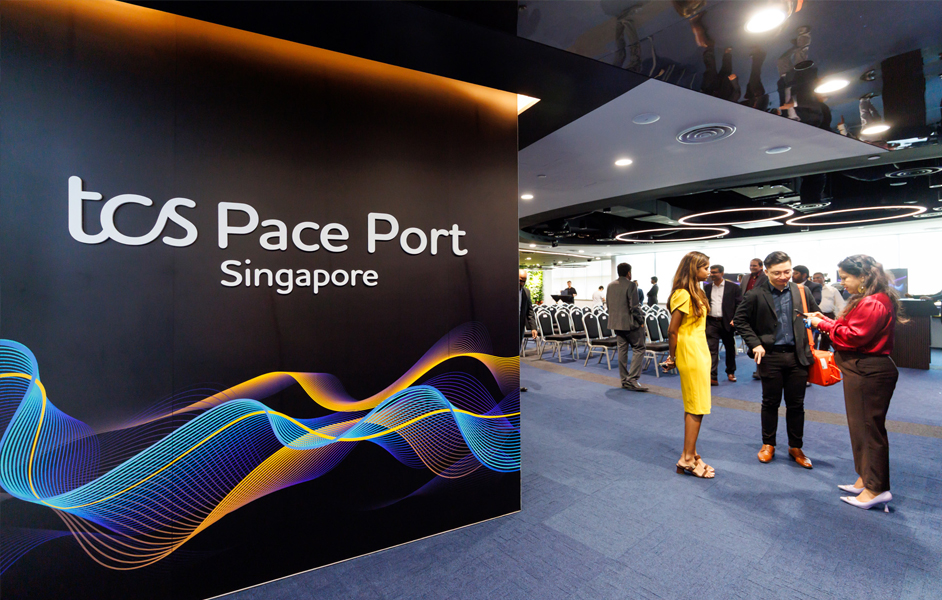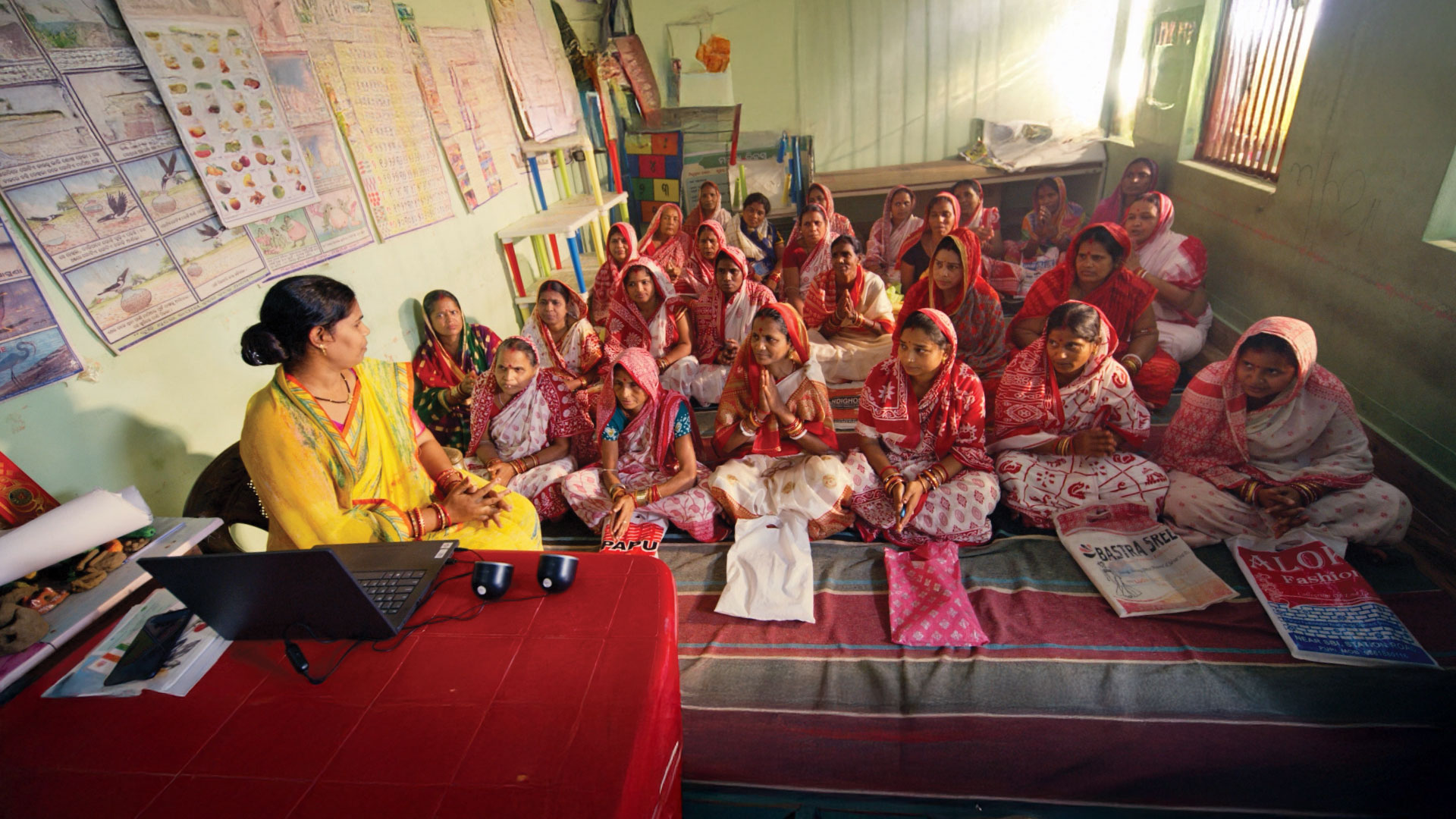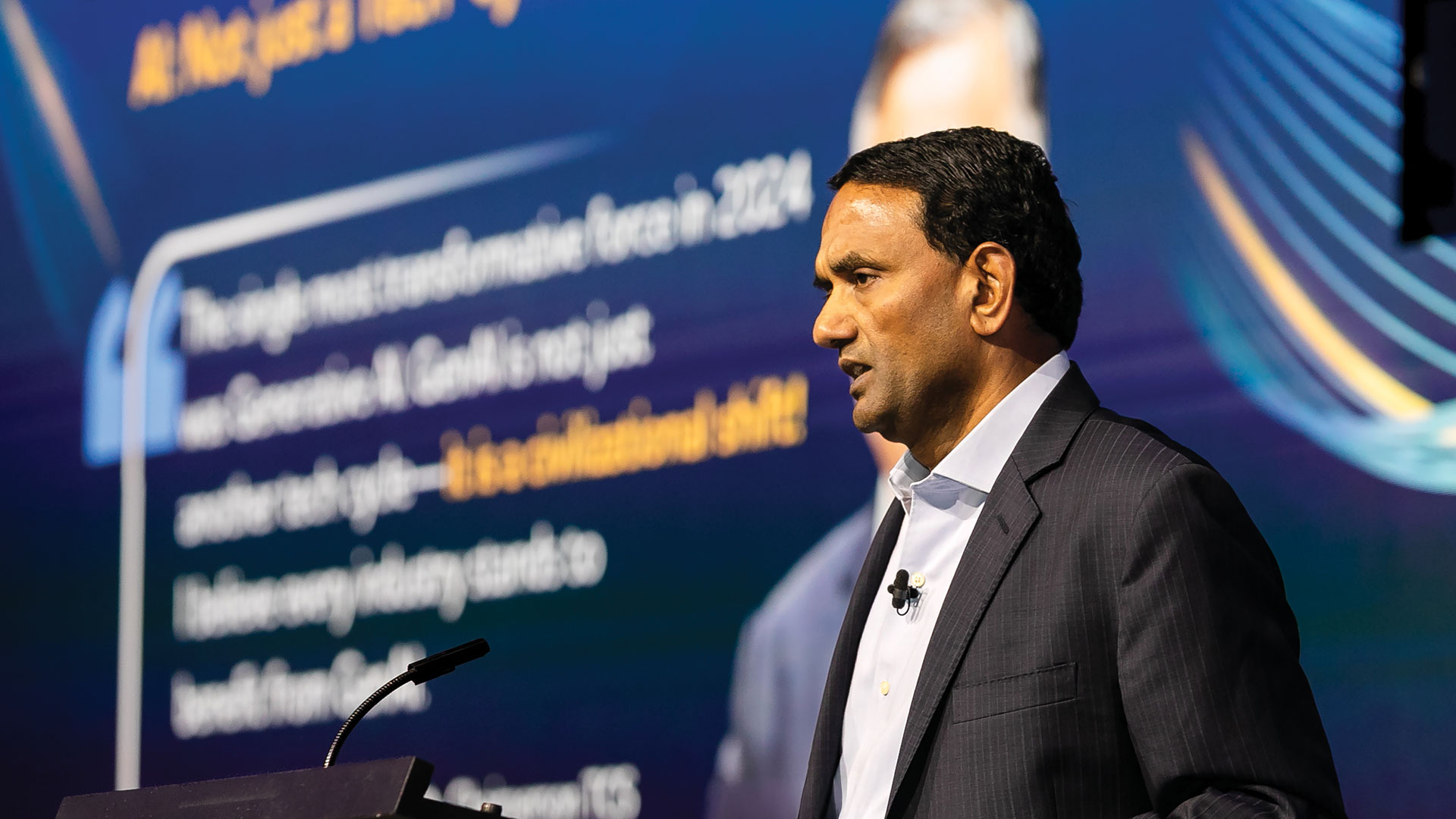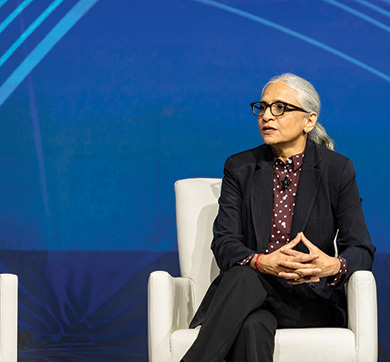November 2025 | 2064 words | 9-minute read
K Krithivasan, Chief Executive Officer and Managing Director, TCS, discusses among other things, the company's long-term vision, its trademark resilience, being perpetually adaptive - and how his role at TCS has tranformed his leadership outlook. Excerpts:
This is a time of great global disruptions — both technological and geopolitical. What makes TCS resilient even in the face of such turbulence?
TCS’ resilience comes from a combination of long-term vision, disciplined execution, and deep client trust that we have built over decades. Whenever the external environment turns uncertain, we fall back on our core strengths, including an industry-leading talent pool, resilient processes, and a culture built on adaptability. Our sustained investments in research, contextual knowledge of industries, and a diversified presence across markets enable us to navigate cyclical and inevitable disruptions while continuing to serve clients seamlessly.
More than just responding to crises, we help our clients build resilience and agility into their own businesses, ensuring that they too are prepared for uncertain times. This approach allows us to remain resilient and relevant, even in the most turbulent global environment.
"What truly differentiates us is that we do not treat AI as a system upgrade. We treat it as a mindset shift."
Perpetual adaptability is no longer optional. It is the defining capability of modern enterprises.
How is TCS sharpening its long-term vision?
Our long-term vision is guided by three pillars. Deepening our role as a strategic partner for clients, embedding AI and sustainability into everything we do, and ensuring that our own talent evolves in tandem with new technologies.
The creation of the role of Chief Strategy Officer reflects TCS’ commitment to sharpening this strategic lens for the decade ahead. This is not just about managing the present, it is about anticipating where industries, technologies, and societies are heading, and aligning TCS to be there first. Already, we are reimagining how AI, cloud, and data can reshape sectors from financial services to manufacturing to healthcare. We are making targeted investments in sovereign cloud, semiconductor design, quantum, and green energy transitions.
Sharpening our long-term vision also means doubling down on innovation hubs and building industry-leading partnerships, ensuring we are constantly learning from ecosystems around the world.
Chairman N Chandrasekaran has called GenAI “a civilisational shift”. How do you see this moment reshaping the Indian as well as the global economy? What role is TCS poised to play in this transformation?
GenAI is more than a new wave of software, it is a foundational shift in how knowledge is created, shared, and applied.
Across industries, we are seeing significant innovation in the AI ecosystem across infrastructure, data platforms, models, and AI native business applications. These innovations are forcing companies to invest in technology modernisation and to rapidly adopt AI to meet evolving customer expectations. The range of transformation is multifaceted and truly profound.
"Perpetual adaptability is no longer optional. It is the defining capability of modern enterprises."
For example, we worked with a client to develop a GenAI-based drug discovery solution that created 1,300 molecules for a concept target, then assessed synthesisability and shortlisted 12 molecules undergoing in vitro testing. For another client, we implemented a direct-to-consumer digital solution for the automotive industry, allowing a seamless omnichannel presence and customised vehicle ownership experience. In another case, we modernised 50 mn lines of legacy code into a modern AI-powered architecture.
These engagements reinforce the significant shifts within each industry.
Globally, GenAI will redefine productivity, accelerate innovation, and even reshape how industries are structured. For India, GenAI represents an inflection point; with its deep pool of STEM talent and entrepreneurial energy, the country can become not just a consumer of AI but a hub for its creation and responsible scaling.

TCS has a unique role here. We combine global reach with local depth. We are already embedding GenAI into solutions for clients, from financial services to healthcare, while also co-creating industry frameworks for safe and ethical adoption. Equally, we are preparing India’s workforce for the AI age, with large-scale reskilling and partnerships with hyperscalers, industry, and academia.
As this civilisational shift unfolds, TCS’ role is to ensure that the benefits of AI are broadly distributed and that enterprises harness AI in a way that is responsible, inclusive, and sustainable.
TCS is also driving AI transformations within the Tata Group. How does working with Group companies influence or inspire your broader AI strategy?
Working with Group companies gives us the opportunity to pioneer innovative solutions for diverse industries. For instance, with Tata Power, we brought India’s EV charging network online through ChargeCore on HOBS™, creating a smarter and more connected mobility ecosystem. With Tata Chemicals, we are leveraging digital twins to boost plant operations and improve efficiency. At Tata Motors, our AI-led platform TCS Cognix™ is transforming their accounts payable process, while for Croma, we have enabled 100% in-store mobile checkout, a first in the retail industry in India. We are also working with JLR, Tata Steel, and Tata Electronics on several innovative solutions
"As this civilisational shift unfolds, TCS’ role is to ensure that the benefits of AI are broadly distributed and that enterprises harness AI in a way that is responsible, inclusive, and sustainable."
These experiences allow us to refine our frameworks, test governance models, and prove the impact of AI in complex, real-world settings. They also showcase the diversity of AI applications, from heavy industry to consumer engagement, and this breadth informs our broader AI strategy.
How is TCS preparing its workforce for the AI-first future?
Our company-wide initiative, tcsAI (TCS to the power of AI) is embedding AI fluency across every function — from developer tools and internal platforms to real-time experimentation, we are enabling every TCS employee to work with AI ethically, creatively, and productively.

Among our many reskilling efforts, the most impactful has been our company-wide AI learning movement, anchored by initiatives like the tcsAI Hackathon and weekly AI Fridays. These programmes have created a culture of curiosity, experimentation, and responsible innovation across the organisation.
What truly differentiates us is that we do not treat AI as a system upgrade. We treat it as a mindset shift. Already, more than 1,80,000 new ideas have been generated by TCS employees. To be future-ready is to constantly adapt our thinking, not just our tools.
Beyond AI, what do you view as the big demand drivers and big risks of FY26?
First, semiconductors are becoming a strategic industry, with nations and enterprises alike seeking self-reliance, and TCS with its end-to-end engineering services across the semiconductor life cycle is well positioned to be a partner to enterprises worldwide.
Second, digital sovereignty is a rising theme.
Third, sustainability is now embedded in every client conversation. From green IT practices to net zero road maps, enterprises are asking how technology can enable their ESG commitments. Internally too, we are committed to green IT practices, modernising our own infrastructure in line with our net zero goals. More broadly, we see digital as a key enabler of the net zero journey, and our role is to help clients integrate sustainability into their business models.
Fourth, quantum technologies are gaining momentum, and it is a future enterprises must prepare for.
"We see digital as a key enabler of the net zero journey, and our role is to help clients integrate sustainability into their business models."
Another area of growth would be cybersecurity. As data becomes the core of every enterprise, safeguarding it against increasingly sophisticated threats is no longer optional, it is critical to business. We see a rising demand for advanced solutions such as sovereign cloud, zero-trust architectures, AI-powered threat detection, and managed security services. Responding to this shift, we recently launched TCS SovereignSecure Cloud™, for government and public sector enterprises, to host mission-critical applications and protect sensitive data in compliance with local regulations.
Layered on top of these are macroeconomic uncertainties and geopolitical realignments, which make resilience and adaptability more critical than ever.
Together, these trends confirm that transformation is no longer about a single technology but about building future-ready enterprises across multiple dimensions.

The new CSO also heads the Global Consulting Practice. Can you highlight the strategic importance of this in the fast-changing business landscape?
It will act as a strategic navigator for enterprises seeking to adapt to rapid technological, economic, and regulatory shifts. As clients face complex choices around AI adoption, digital sovereignty, quantum readiness, sustainability, and resilient supply chains, the Global Consulting Practice brings deep industry expertise and a cross-disciplinary perspective to help them chart the right course.
TCS has a growing network of innovation centres around the globe. How critical are they to reshaping TCS for the future?
Our innovation centres are critical because they bring together three forces: clients, ecosystems, and technology. Spread across major markets, these centres allow us to co-innovate and co-create with clients in real time, test AI applications in context, and quickly scale the successful ones. Equally, they connect us with academia and startups, keeping us ahead of technology shifts. The innovation hubs also play a key role in shaping our own talent. They expose associates to newer challenges and create a culture of innovation. In a fast-changing environment, innovation centres act as our sensors to the future and our accelerators for client impact. They are where the promise of AI and digital takes shape as solutions that can be deployed at scale.
How is TCS using technology to drive humankind forward? What are some lesser-known but high-impact initiatives that you are particularly proud of?
At TCS, technology has always been more than a driver of business outcomes, it is a catalyst for societal progress. Across national priorities, citizen services, and inclusive growth, we have consistently worked on initiatives that improve lives globally.
"Today, seven out of 10 Indians use tech built by TCS, directly or indirectly, every single day, whether it is through banking, telecom, healthcare, governance, or citizen services."
Our Accelerating India campaign highlights how TCS is helping the country move from a services hub to an innovation hub. Our sovereign cloud initiative is a critical effort in ensuring India’s data is managed with trust and autonomy, while building digital infrastructure for the future. We are investing in semiconductor design capabilities, which align with India’s ambition to build self-reliance in a strategically vital industry. We partnered with BSNL to modernise India’s telecom infrastructure and strengthen digital connectivity. We are also collaborating with the Government of Andhra Pradesh to build India’s largest quantum computing hub, aimed at solving complex real-world challenges.
In governance, TCS has enabled the Election Commission of India with digital solutions that make electoral processes more transparent and efficient.
In citizen services, we are driving the Passport Seva Programme 2.0, in partnership with the Ministry of External Affairs, to modernise passport issuance, expand Passport Seva Kendras, and deliver faster, more reliable services nationwide. And through the System for Pension Administration Raksha (SPARSH) portal, we modernised pension management for India’s defence personnel, streamlining pension disbursement for 3 mn+ retired service members.

In healthcare, our digital platform has helped extend government-funded medical treatment to 500 mn+ underprivileged Indian citizens.
In education, our Literacy as a Service programme has transformed learning outcomes for 2.61 mn learners and empowered more than 2,40,000 facilitators across India and Africa, sustaining long-term impact for the past 25 years. Our large-scale skilling programmes are preparing millions of young people for the digital economy, ensuring that India’s demographic dividend translates into real opportunity.
Today, seven out of 10 Indians use tech built by TCS, directly or indirectly, every single day, whether it is through banking, telecom, healthcare, governance, or citizen services. Meanwhile, at a global scale, nearly 30% of the world’s population benefits from TCS BaNCS™ services in banking and financial inclusion. These initiatives reflect how TCS is not only enabling India’s next stage of growth but also creating scalable frameworks that can be applied to other geographies.
"Personally, my journey has reinforced my belief in purpose-driven leadership, that technology must serve clients, societies, and the planet in equal measure."
These are just a few examples of how TCS balances business impact with societal value, using technology responsibly, inclusively, and for the greater good. That alignment between innovation and human progress is something we are deeply proud of.
How has leading TCS at this pivotal moment shaped you and your leadership approach?
It has been both humbling and energising. On the one hand, we are navigating profound disruptions, from the rise of AI to geopolitical realignments. On the other hand, we are building on a legacy of resilience and global leadership. This balance shapes my leadership approach: ensuring we are perpetually adaptive. It means focusing on the long term even while responding to immediate shifts.
Personally, the journey has reinforced my belief in purpose-driven leadership, that technology must serve clients, societies, and the planet in equal measure.
- Monali Sarkar













